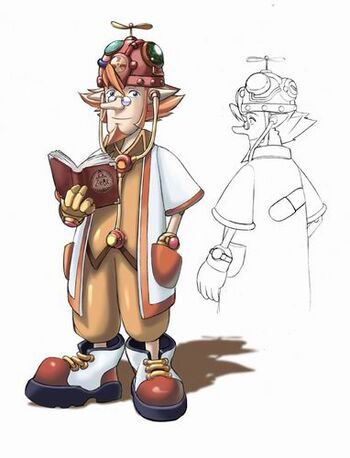NPC: Difference between revisions
1d4chan>Dark Angel 2020 |
1d4chan>Dark Angel 2020 |
||
| Line 50: | Line 50: | ||
Some rulesets, like [[Star Wars RPG|Saga Edition Star Wars]] or [[Only War]] do companion characters unobtrusively and subtly so that they cannot be broken and they end up behaving as an extension of the character themselves. While other rulesets suffer from creating their companions exactly the same way as PCs. | Some rulesets, like [[Star Wars RPG|Saga Edition Star Wars]] or [[Only War]] do companion characters unobtrusively and subtly so that they cannot be broken and they end up behaving as an extension of the character themselves. While other rulesets suffer from creating their companions exactly the same way as PCs. | ||
====Leadership==== | |||
One of the worst offenders is the 3rd Edition '''Leadership''' feat from D&D, which grants the player who takes it a major NPC cohort as well as a loyal group of low level followers. | |||
The original ruleset explicitky stipulated that followers had to be generated from the shitty NPC classes of '''Commoner, Warrior''' and '''Expert''' and who never gained experience. Though the later revision and [[Pathfinder]] missed that part out. The Cohort that summoned also comes in at several levels lower than the player, and gains experience at a reduced rate. | |||
Many Games masters simply ban Leadership, or any feat that grants cohorts and followers out of hand rather than deal with the hassle of a whole bunch of mini-PCs. But this need not be absolutely necessary. | |||
== When Things Go Wrong == | == When Things Go Wrong == | ||
Revision as of 11:56, 19 October 2016

A Non Player Character is a character under the control of the GM. They are there to provide backstory to a campaign, and to advance the plot or to un-snag narrative hooks. The role of the NPC is essentially to provide and infuse life to the game, so the Players have an avenue to suspend their disbelief (and ignore the fact that they are just a horde of sweaty guys in a basement with a bunch of dice). A world full of NPCs who are played well can lend credence to the reality of the world.
Sadly, this doesn't always happen, and the noble NPC is abused by many a DM who either doesn't know any better, or is a raging prick.
Types of NPCs
Inhabitant
These NPCs act as normal people would. Going about daily lives, maybe interacting with the characters, maybe not. They aren't spectacular in any way, but they're realistic. Like King of RPGs says, the GM doesn't just play the monsters, they play the millions of people in the game world that bear you no ill will whatsoever. This is a Good NPC, and, done right, can replace any other NPC on this list.

Quest Dispenser
Idiot cousin to the Inhabitant, this NPC waits around all day with their problem. They always have a problem, big or small, and they always just happen to be waiting for some strapping young lads like your party to help them out. Done wrong, they have little personality, totally helpless, and entirely necessary to begin or continue the plot as the DM has it laid out. This is a Crap NPC, but with a little work and imagination a good DM can turn them into a Good NPC by giving them, say, good reasons not to be able to help you out, or enough personality to make them enjoyable to watch.
Lackey
A dumb NPC that's there simply to take direction from the PCs. No free will to speak of, and is often used as a meat shield when danger arises. This is a Crap NPC. However, they make up your rank-and-file soldiers in the armies of the Player Characters and the villains when campaigns become campaigns, so they tend to be more acceptable then some of the other types below.
Hireling
Similar to a Lackey, but a bit smarter. They get surly and won't interpose themselves between the PCs and danger willingly. This is a Good NPC.
Vend-O-Mat
Usually a cleric, these NPCs act as mobile vending machines, dispensing healing spells or buffs at the push of a button. They usually have no personality. This is a Bad NPC.
Psychopath
Fucked up for no reason. Brilliant in conversation, stupid in action. Exist solely to add 'flavor' to a DM campaign. Once in a blue moon, this NPC is tolerable. As a regular, he shifts from Crap NPC to Bad NPC. The archetype is given a free pass if they are player characters, though.
DMPC
The DM really wanted to play, and so made a character up. Only now, he's in control, so things tend to go the NPCs way. He will often be min-maxed, but arbitrarily so, as the abilities seem to change with the encounters as they require. This is a Bad NPC - unless he knows how to stay out of the way for most of the time, which usually doesn't happen. Gandalf is often accused of being the only Good DMPC.(Almost, actually Tom Bombadil was the DMPC)
Gary-Stu/Mary-Sue DMPC
As above, but with features that resemble the DM or his girlfriend. This is what the DM wants to be in his fantasy. There usually is a wall-o-text dialog from the NPC explaining his backstory, even if you just asked him for directions to a brothel. This is a Horrendously Bad NPC, and players are advised to be as subtle as possible in the execution of him or her, so the DM will only see what you did there after it has been done. And trust us, you will ALL want to kill this NPC.
Help with running NPCs
GMs often have difficulty using NPCs appropriately in their campaigns. Depending on the particular brand of GM, they might spend a disproportionate amount of time statting them or writing elaborate back stories, only to get killed or utterly bypassed by the players. They might also have difficulty actually role-playing a NPC who might only have had a limited role in their storyline, but the players keep going back to them.
So here are a few useful tips to remember for running your own NPCs.
- If you really have to give them a long-winded, poncy, made-up name, make sure you give them a title that the players can use.
- No-one remembers the difference between "Sunatela Estavros", "Donitri Kaliean" or "Likorian Goldmantle" but they do remember "King", "Guard Captain" and "Court Wizard"
- You don't always need to create the characters using the same method as the players; adding classes, skills and talents in order to "level" them to an appropriate match for the encounter. Especially if they are intended only to perform particular roles. It's easier to just use simple stat-blocks detailing hit points, any relevant saves, attacks and equipment.
- A GM controlled NPC doesn't need Knowledge or Lore skills but should have all necessary information relevant to his part of the plot. More can be added later if need be.
- When actually "role-playing" NPCs, rather than sometimes it's easier to just play alignments rather than complex personalities. So you don't get stuck figuring out what a given character has to do when presented with odd situations the party inevitably generates. These are not exhaustive, but mean you don't need to have a spreadsheet of motivations at hand when players press an issue.
- Good NPCs are generally helpful, Neutral NPCs usually aren't interested in assisting unless incentives are offered. Lawful NPCs typically have reservations against social faux pas and antisocial behaviour, while Evil NPCs simply want to take the players stuff from them .
Player NPCs
Player controlled Companions, Cohorts, Followers and minions often cause nightmares for even the most accomodating GMs. Mostly because any opportunity the players get to create more characters they will use to powergame or munchkin the crap out of.
What's the point of having one balanced character who can help out in several situations and gave an interesting back story, when you have a team of one dimensional guys who are unrealistically maxed out in single skills and have only ever done one thing in their life ever? This is natural player behaviour because even the most innocent person is not going to enjoy retreading the same ground with new characters, so will build new supporting characters with their primary PC in mind. In the worst case, you get exp batteries or crafting monkeys who do nothing other than self-lessly make the PCs gear for them. But even in the most harmless of situations you get nameless dogsbodies who do nothing other than carry player gear around and act as extra inventory slots.
Some rulesets, like Saga Edition Star Wars or Only War do companion characters unobtrusively and subtly so that they cannot be broken and they end up behaving as an extension of the character themselves. While other rulesets suffer from creating their companions exactly the same way as PCs.
Leadership
One of the worst offenders is the 3rd Edition Leadership feat from D&D, which grants the player who takes it a major NPC cohort as well as a loyal group of low level followers.
The original ruleset explicitky stipulated that followers had to be generated from the shitty NPC classes of Commoner, Warrior and Expert and who never gained experience. Though the later revision and Pathfinder missed that part out. The Cohort that summoned also comes in at several levels lower than the player, and gains experience at a reduced rate.
Many Games masters simply ban Leadership, or any feat that grants cohorts and followers out of hand rather than deal with the hassle of a whole bunch of mini-PCs. But this need not be absolutely necessary.
When Things Go Wrong
Sometimes, NPCs do NOT work out like the GM planned. One of these stories is the one of Kren and Frep, two NPCs in the authors Rogue Trader (RPG) group. Kren and Frep were just basic fleet armsmen, armed with mighty (...not) shotguns and wooden fighting sticks. They were "introduced" when two random dudes standing in a fleet dock were admiring the ship of the players, who proceeded to instantly hire the two.
GM: well, fuck. (now i have to think of stats and stuff...)
Anyways, they ended up carrying a large medi-kit and a life-saving backpack for the party around, following them and doing not much else.
They were just following the PCs and discharging the odd shotgun shell. They even managed to kill some random cultists with their wooden sticks after some lucky rolls.
In one mission, the party was on a derelict ship, and they were constantly finding random stuff strewn across the floor, sometimes even weapons. One of the PCs found some guns he had no use for (he was a Kroot). And gave them to our valiant armsmen. A rare sort of boltgun and a best quality lasgun.
And then. All went to Shit.
Those two flaming assholes sure as hell DID roll multiple "righteous fury" when they hit the final boss of the mission, an Alpha Legion Chaos Lord, killing it with 64 wounds inflicted when he had 28 left. (Yes, the PCs DID manage to plonk off 2 hp before).
Originally, when creating the adventure, I intended to have the one who killed the Lord gain a special reward, and so thought of revoking the fact they killed him (like, they misfired or something), to give my group the chance of killing the bad guy actually themselves. But, after somewhat 15 minutes of everybody lying on the floor and almost pissing ourselves of laughter when we had realized what had happened, everybody agreed whe'll let it stand like that.
Still, Kren and Frep get a full Henderson for this.